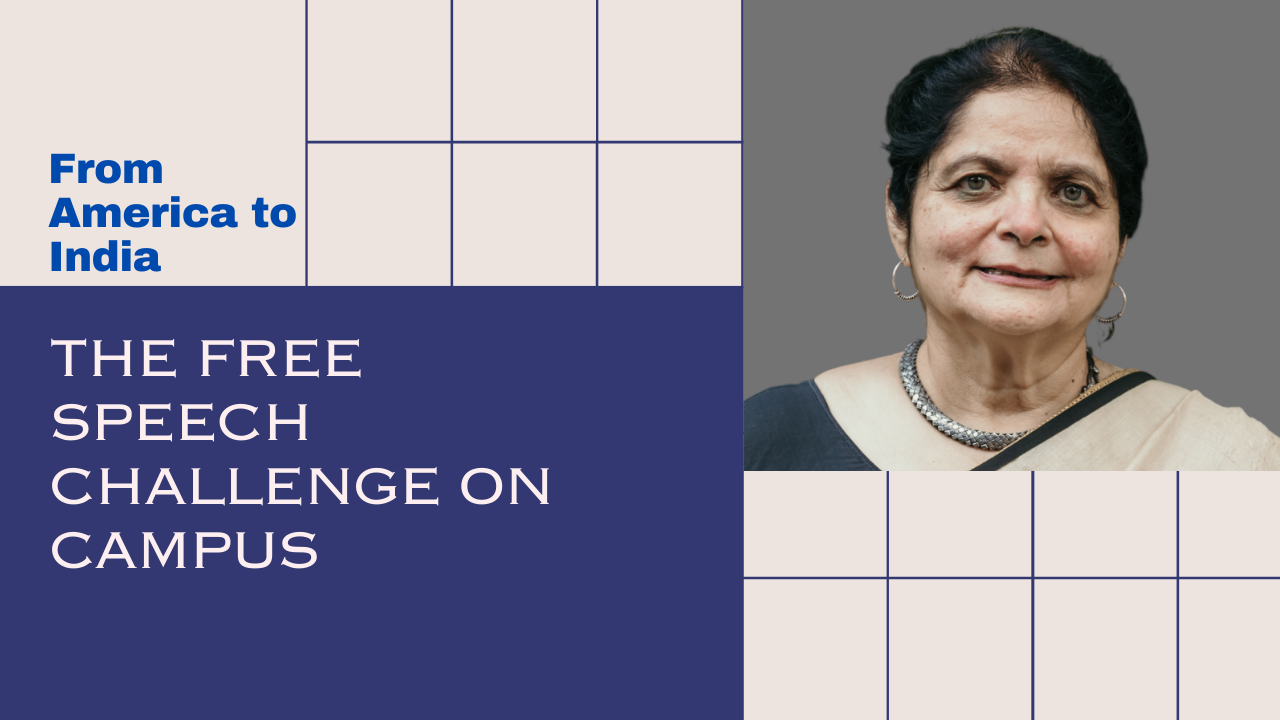From America to India, the free speech challenge on campus
13 Jan 2024
Opinion: Sonalde Desai.
If universities are to remain home to creativity, they must embrace both radical thinking and scepticism toward received wisdom. This is important not just for humanities and social science but also for science and engineering.
In recent weeks, two American university presidents, Claudine Gay from Harvard and Liz Magill from the University of Pennsylvania, resigned from their positions after evasive responses during a testimony at a Congressional hearing on anti-Semitism on campuses following the October 7 attack by Hamas in Israel. President Magill from the University of Pennsylvania explicitly condemned anti-Semitism as well as Islamophobia, but still, she came under fire for refusing to relieve a professor who led chants for intifada, revolution, that has come to characterise calls for violent protests by Palestinians against the Jewish state. President Gay from Harvard, also under fire, resigned voluntarily to protect the institution from further controversy.
This incident provides an intriguing insight into the culture wars of 21st century America while offering a cautionary tale for other nations seeking civil discourse about difficult issues. Freedom of expression is enshrined in the American Constitution and is often taken to an extreme where the individual right to carry guns or to burn the American flag is hotly defended. Nonetheless, as this incident shows, this freedom is under considerable threat, a threat that is not limited to the present controversy.
In the cases of Harvard and Pennsylvania, this threat came under the guise of creating a safe space for Jewish students, accompanied by the financial clout of donors and alums. But it is not simply the power of donors that has generated such a powerful backlash. We also see a similar desire to avoid controversy and protect the sensibilities of diverse communities in other cases.
For example, the dismissal of Professor Erika López Prater from Hamline University for actions deemed Islamophobic. Her crime? She showed an image of a 14th century painting depicting Prophet Mohammad in a course in global art history. A student in her class complained that the pictorial depiction of the Prophet was against religious diktats, and it made him feel disrespected. The administration took the side of the student, and the New York Times reported Hamline’s president, Fayneese S Miller, as having sent an email that said respect for the Muslim students “should have superseded academic freedom.”
Moderating or censoring speech to what in India we term “respecting the sentiments” of some communities is often classified in the US as protecting vulnerable groups from microaggression. In most settings, power still rests in the hands of white men, creating a hostile environment for women and racial or gender minorities. Efforts at identifying behaviours that construe aggression in day-today interactions, often termed microaggression, have gained currency. Redressal usually involves instituting diversity programmes in universities and large businesses. Fareed Zakaria, in a perceptive article, argues that the growth of this DEI (diversity, equity and inclusion) bureaucracy has given rise to a culture of virtue signaling and fed demands from Jewish students for protection from hurtful speech, as other groups have demanded in the past.
And yet, the road to hell is often paved with the best intentions, and diversity initiatives do not always increase diversity. A fascinating study of large businesses by Harvard Sociology Professor Frank Dobbin, published in Harvard Business Review, finds that mandatory diversity training for managers has reduced rather than increased diversity. Blaming and shaming led to the hardening of biases, and diversity training was associated with a reduction in black women managers as well as Asian managers. Moreover, attempts at enhancing comfort and silencing strident debate come at a price.
Modern universities — in the United States and globally — are buffeted by two competing forces. On the one hand, there is a recognition that existing inequalities can create a hostile environment for some students. On the other hand, trying to protect against it can diminish spaces for dissent and debate in institutions designed to foster creativity. Struggling to find a balance between the two, a report of the Committee on Freedom of Expression by the University of Chicago quotes its President Hanna Gray, “Education should not be intended to make people comfortable, it is meant to make them think.”
If universities are to remain home to creativity, they must embrace both radical thinking and scepticism toward received wisdom. This is important not just for humanities and social science but also for science and engineering. Arguably, the most visible example is periodic attempts by various US state legislatures to restrict the teaching of evolution in schools since it is inconsistent with the Christian conception of how the universe was created.
Radical thinking and scepticism towards received wisdom are not readily embraced. They imply not simply accepting ideas we like but also being open to ideas that are not consistent with our other beliefs and social norms or may be hurtful to some segment of our society, whether they are about the right of the state of Israel to displace Palestinians, caste-based reservation or scientific discoveries. Temples of education are not places where ideological battles should be fought. As Claudine Gay notes in an essay in The New York Times, “At tense moments, every one of us must be more sceptical than ever of the loudest and most extreme voices in our culture, however well organised or well connected they might be.”
The writer is a Professor at the University of Maryland and the National Council of Applied Economic Research. Views are personal.
Published in: The Indian Express, 13 Jan 2024






